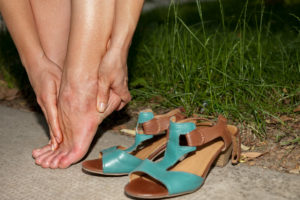 Bunions are a common forefoot deformity. The first metatarsal slides out of alignment and starts leaning away from its neighbors. The big toe then leans toward the smaller digits, so an easily irritated bulge forms on the sides of the joint where the two meet. What causes bunions is often misunderstood, though. Here are a few common half-truths about bunion formation and the facts behind them:
Bunions are a common forefoot deformity. The first metatarsal slides out of alignment and starts leaning away from its neighbors. The big toe then leans toward the smaller digits, so an easily irritated bulge forms on the sides of the joint where the two meet. What causes bunions is often misunderstood, though. Here are a few common half-truths about bunion formation and the facts behind them:
- High heels cause bunions – While frequently using high heels can exacerbate the problem, they aren’t the cause. The cause is a biomechanical weakness that allows the metatarsal and toe to slide out of alignment. The added pressure on the forefoot from wearing high heels can make the problem much worse, however.
- Too-tight shoes cause bunions – Again, the shoes aren’t the root cause; a weakness in your foot—which you might have inherited—is the culprit. Wearing tight, narrow shoes, though, can influence your bunion and definitely help it worsen.
- Having them in your family means you’ll have one – The foot issue that allows bunions to form can certainly run in families. However, having parents or siblings with the problem doesn’t guarantee you’ll have it, too.
- Arthritis in your toe will give you a bunion – Arthritis can certainly contribute to bunions and make them more painful. But again, having arthritis doesn’t guarantee a bunion.
Part of getting your bunion treated involves knowing why it formed in the first place, so you can help prevent it from returning in the future. Our specialists with Mitchell Wachtel, DPM are here to help you every step of the way, from diagnosis through all your care. If you’re wondering if you have a bunion, or are already living with forefoot pain, come have it checked today! You can reach our Massachusetts offices in North Andover, Lowell, and Haverhill by calling (978) 794-8406 or by using our website to reach us.
